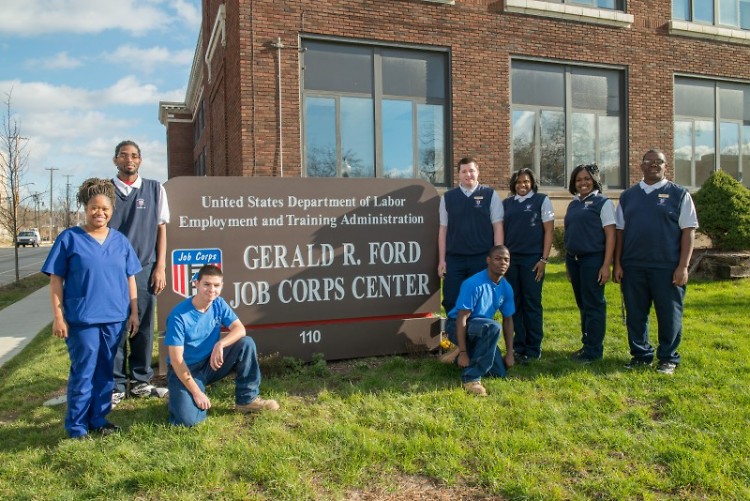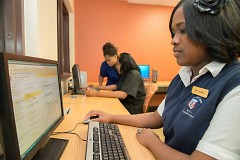“I want to improve myself, to change—that’s why I’m coming here." --Sam, Job Corps student
The Gerald R. Ford Job Corps Center takes literacy seriously.
“Every student has some barriers to their success, and for a lot of them, lack of literacy really plays a negative role in their lives,” says Melissa Jager, Director of Programs at the center. “It’s difficult [to find] employment if you can’t read at a certain level, can’t comprehend at a certain level, and it’s difficult moving forward with the rest of your life.”
And moving forward in life is exactly what Job Corps is all about.
The center provides students with the education, career technical training skills, social skills, and independent living skills they need in order to be successful. The hope is that when students leave the program, they will transition into a career that will help them sustain a life at least in the middle class, so that they become tax payers rather than rely on welfare assistance.
“Our goal is to get all of our students job-attached before they separate and then we follow up with them for a year,” Jager explains.
If students lose a job, they receive references as well as help brushing up their resume. If they have a housing issue, Job Corps staff helps them secure housing and daycare.
While in the program, the 16-24 year old students design their own self-paced course of study, choosing from high school completion, GED, Adult Basic Education, and career technical training in seven different fields.
“We always tell students that glacial is not a pace that we accept,” Jager says with a smile. “Some students believe that ‘self-paced’ means ‘as much as I would like to work,’ but really our goal is for all students to work a full day every day.”
Job Corps students have been working hard since the program's founding in the 1960s as part of Lyndon B. Johnson’s War on Poverty. Next summer, the center will celebrate its 50th anniversary.
And what is there to celebrate?
“These students are amazing,” says Business Community Liaison Gretchen LaHaie of the 192 students currently enrolled in the program. “They do amazing things every day.”
A small percentage of students come from Indiana, Ohio, and West Michigan, with the majority hailing from Lansing eastward. One student, Sam, is a refugee from Eritrea. Many students come from economically disadvantaged environments. The average student arrives at Job Corps with a 3rd-4th grade math level and 5th-6th grade reading level.
“One thing they all have in common is that they’ve all overcome some type of adversity,” says LaHaie, “but each student has their own unique story of how they ended up at Job Corps.”
LaHaie cites the program’s wrap-around quality as the unique key to its success. Students live on-site and are held accountable in their daily routines and decision making. Not only does this enhance the employability aspect of the program 24/7 but, as LaHaie points out, “it also keeps students from going home in the evening to the same negative influences that are preventing them from being successful.”
For Jager, fostering her students’ love of reading is a sure sign of success.
“One of the biggest predictors of success out of high school is how many books you read outside of the curriculum,” she says. “Getting our students interested in reading really opens up the world for them.”
The center uses Scholastic’s READ 180, a literacy program that has helped students like Sam—who formerly spoke no English and relied on a translator when he arrived at Job Corps—to increase their language skills.
“I want to improve myself, to change—that’s why I’m coming here,” Sam said of his Job Corps experience.
After spending much of his youth in refugee camps, Sam came to the United States and found work in a factory. His determination led him to begin learning English through ESL classes at Beckwith School and to progress rapidly in math, literacy, and trade completion programs at Job Corps. He hasn’t seen his parents in 10 years.
Jager explains that the students who do best after leaving the program are those who build their own family units and rely on one another for support.
“It’s a big change,” she says of the transition to the workforce.
And yet, with the training, guidance, and encouragement received from Job Corps’ dedicated staff, it seems these remarkable students are up to the challenge.
The Rapidian, a program of the 501(c)3 nonprofit Community Media Center, relies on the community’s support to help cover the cost of training reporters and publishing content.
We need your help.
If each of our readers and content creators who values this community platform help support its creation and maintenance, The Rapidian can continue to educate and facilitate a conversation around issues for years to come.
Please support The Rapidian and make a contribution today.

